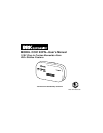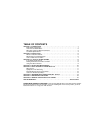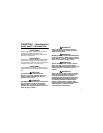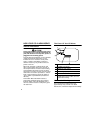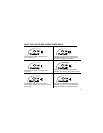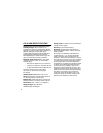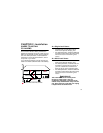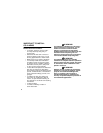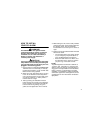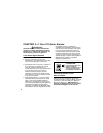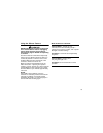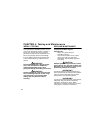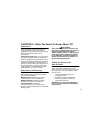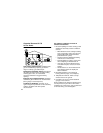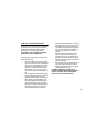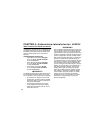
4
CO ALARM SPECIFICATIONS
Gas Detection at Typical Temperature and
Humidity Ranges:
The CO Alarm is not
formulated to detect CO levels below 30 ppm
typically. UL tested for false alarm resistance to
Methane (500 ppm), Butane (300 ppm),
Heptane (500 ppm), Ethyl Acetate (200 ppm),
Isopropyl Alcohol (200 ppm) and Carbon
Dioxide (5000 ppm). Values measure gas and
vapor concentrations in parts per million.
Required Alarm Levels:
Before 10% COHb
exposure at levels of 30% to 70% Relative
Humidity (RH):
• 400 ppm CO between 4 and 15 minutes
• 150 ppm CO between 10 and 50 minutes
• 70 ppm CO between 60 and 240 minutes
The unit is designed not to alarm when
exposed to a constant level of 30 ppm
for 30 days.
Audible Alarm:
85dB minimum at 10 feet
Power:
Powered by 120V AC. When power is
on, green light shines continuously.
Malfunction:
Yellow light shines continuously.
Red light flashes. Horn chirps twice a minute.
Dimensions:
5.83" x 3.32" x 1.6" (Approx.)
Supply Voltage:
120V AC 60Hz
.085A Standby .087A Alarm
During Alarm:
CO Alarm horn sounds while the
red light flashes rapidly.
Warranty:
5-year limited warranty.
Standards:
Underwriters Laboratories Inc.
Single and Multiple Station carbon monoxide
alarms UL2034.
According to Underwriters Laboratories Inc.
UL2034, Section 1-1.2: “Carbon monoxide
alarms covered by these requirements are
intended to respond to the presence of carbon
monoxide from sources such as, but not limited
to, exhaust from internal-combustion engines,
abnormal operation of fuel-fired appliances,
and fireplaces. CO alarms are intended to alarm
at carbon monoxide levels below those that
could cause a loss of ability to react to the
dangers of Carbon Monoxide exposure.” This
CO Alarm monitors the air, and is designed to
alarm before CO levels become life threatening.
This allows you precious time to leave the
house and correct the problem. This is only
possible if alarms are located, installed, and
maintained as described in this manual.



